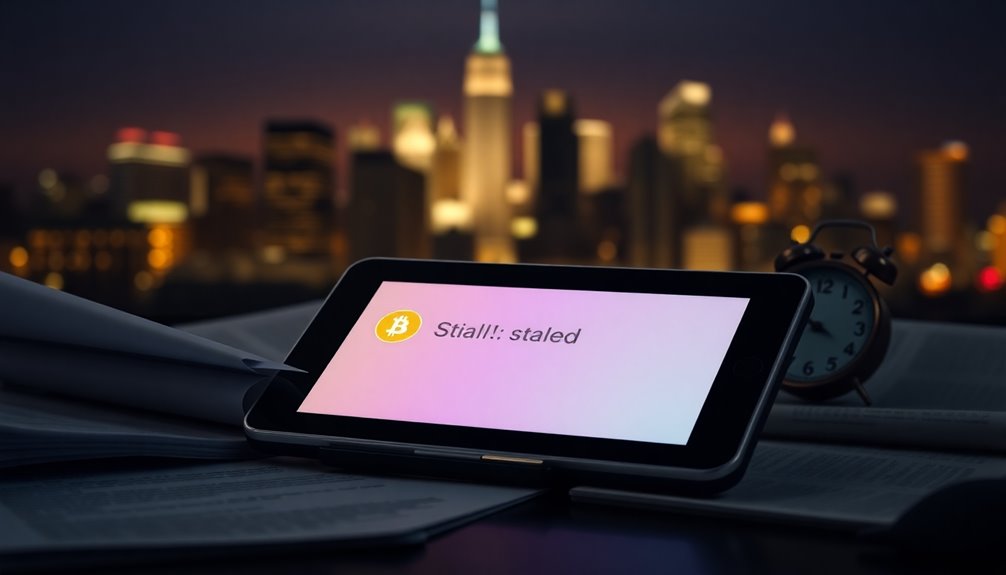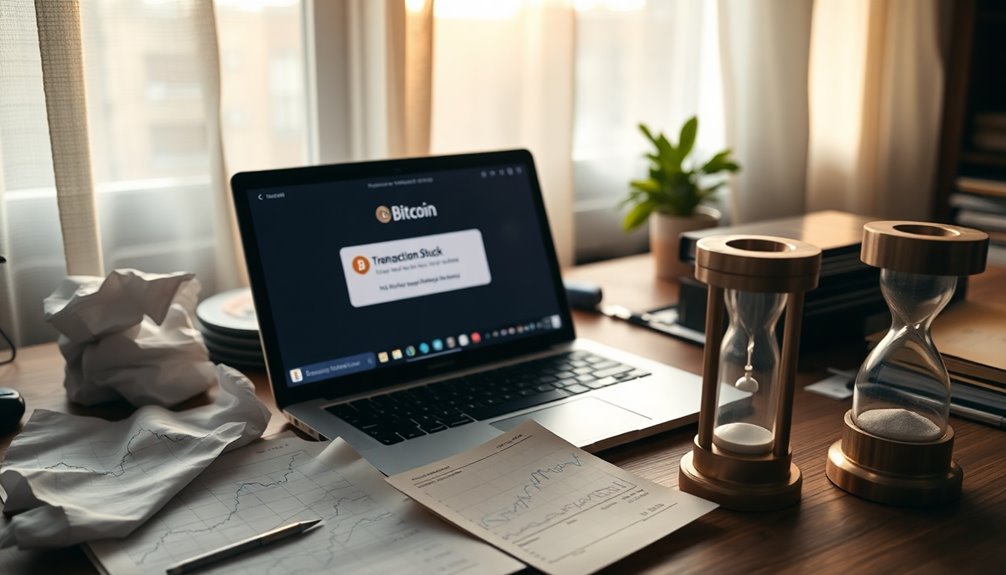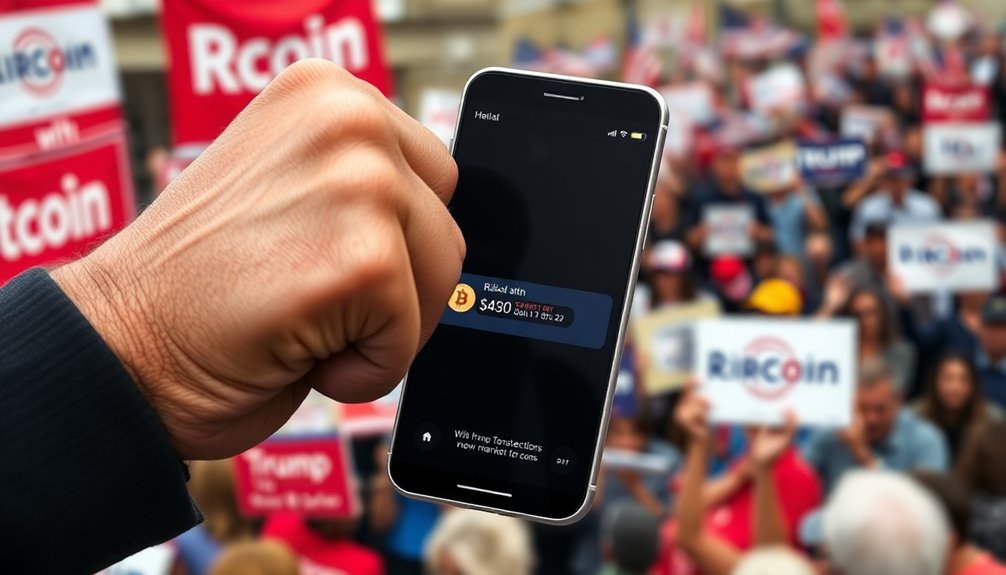If you've got a stuck Bitcoin transaction, it's likely due to network congestion or low fees. Miners prioritize higher-fee transactions, so consider using the Replace by Fee (RBF) feature available in some wallets to adjust your fee post-initiation. Keep an eye on market trends and regulatory changes; these impact transaction speeds too. Implementing better strategies can minimize delays and help you transact more efficiently in the future. Curious about more solutions and insights to tackle stuck transactions? You won't want to miss what's coming up next!
Key Takeaways
- Check Mempool Status: Monitor the Bitcoin mempool for congestion levels to determine optimal transaction timing and avoid delays.
- Increase Fees with RBF: Utilize the Replace by Fee (RBF) feature to adjust transaction fees and expedite processing if stuck.
- Choose High-Fee Transactions: Submit transactions with higher fees to improve the chances of miners prioritizing your transaction during peak times.
- Use Efficient Wallets: Opt for wallets that provide real-time fee recommendations to ensure timely confirmations.
- Stay Informed on Regulations: Keep updated on regulatory changes that may impact transaction processing and compliance requirements.
Understanding Bitcoin Transaction Delays

When you're trying to send Bitcoin, delays can be frustrating, especially if you're unaware of the factors at play.
One major issue is mempool congestion, which occurs when transaction volumes surge and demand for block space increases. Miners prioritize higher-fee transactions, so if you attach a lower fee, your transaction might linger in the mempool for hours or even days. This congestion leads to longer confirmation times, leaving you uncertain about when your Bitcoin will finally go through. During periods of congestion, longer confirmation times can result from miners selecting transactions based on fee priority.
To navigate this, consider attaching higher fees to expedite your transaction. Some wallets offer features like Replace by Fee (RBF) that let you adjust fees on the fly, helping you avoid unnecessary delays.
Regulatory Changes Impacting Transactions

As regulatory changes unfold, they significantly impact how you conduct Bitcoin transactions.
In the U.S., the potential shift of oversight from the SEC to the CFTC could lead to clearer rules, making compliance easier for you and reducing legal uncertainties. This clarity might encourage innovation and faster adoption of new crypto products. Moreover, the anticipated regulatory approval of Bitcoin and Ethereum ETFs is expected to enhance market stability and bring significant capital into the crypto market. Additionally, the evolving landscape of tax-efficient growth strategies may further incentivize investors to engage with Bitcoin.
Meanwhile, Europe's MiCA regulation standardizes crypto operations, requiring licenses that enhance consumer confidence.
You'll also face new IRS requirements for tracking your crypto transactions meticulously, increasing your administrative burden but promoting transparency.
Finally, the repeal of SAB 121 and new Treasury regulations could simplify reporting, streamlining your obligations and fostering broader acceptance of cryptocurrencies in your financial dealings.
Market Volatility and Price Fluctuations

Market volatility and price fluctuations in Bitcoin can feel unpredictable, especially with various factors at play.
Recent inflation data showed a lower-than-expected rise in the producer price index, which helped lift Bitcoin's price. However, net outflows from Bitcoin ETFs, like the $284.19 million seen on January 13, 2025, can add to the market's volatility. Additionally, the total cryptocurrency market cap reached $3.41 trillion, reflecting a 1.43% rise, indicating a broader recovery in the market. The rise in market cap is also influenced by the growing interest in DAOs (Decentralized Autonomous Organizations), which can democratize investment opportunities.
The upcoming Consumer Price Index data release is another crucial factor that might sway Bitcoin's short-term trajectory. While Bitcoin briefly dipped below $90,000, it rebounded to $97,014, demonstrating its historical resilience.
As an investor, it's essential to focus on Bitcoin's long-term potential while being ready for these inevitable short-term fluctuations. Many analysts remain bullish about Bitcoin's future price increases by the end of 2025.
Corporate Blockchain Integration

Corporate blockchain integration is reshaping how businesses operate, offering innovative solutions that enhance efficiency and security. By merging AI with blockchain, smart contracts are evolving, utilizing AI-driven conditional decision-making. This integration tackles data integrity issues and boosts operational efficiency, democratizing AI access for all businesses. Furthermore, the anticipated $600 billion market for tokenization of real-world assets by 2030 underscores the significant impact of this technology on capital formation. Float mounting textile art techniques can serve as a metaphor for how businesses can present their innovations in a clean and professional manner.
Tokenization of real-world assets is also gaining momentum, with the market expected to reach $600 billion by 2030. Major financial institutions are leading this charge, creating new avenues for capital formation.
Additionally, blockchain enhances data security through digital signatures and immutable records, reducing disputes and streamlining supply chain management. By automating manual tasks with smart contracts, companies can lower labor costs and improve overall efficiency, paving the way for sustainable growth.
Election Year Market Reactions

With the integration of blockchain technology reshaping business operations, another significant factor impacting the economy comes into play: election year market reactions.
Historically, the S&P 500 shows positive growth after elections, often rising nearly 5% between election day and Thanksgiving week. If the index is trending upward on election day, you can typically expect a 7% increase in the following six months. Conversely, negative trends often continue post-election.
Market sentiment shifts dramatically post-results, with a surge in stock prices and reduced volatility. Sectors like financials and fossil fuels are likely to outperform, driven by increased investor confidence and policy expectations. This post-election optimism is often fueled by high levels of animal spirits among investors, indicating a strong expectation of economic growth.
As you navigate these trends, keep an eye on potential shifts in portfolio allocations.
Transaction Speed Innovations

As blockchain technology evolves, innovations aimed at enhancing transaction speed are becoming crucial for users navigating increasingly congested networks. You can optimize your transaction fees to avoid conflicts during peak times, ensuring quicker processing. Layer-2 solutions like the Lightning Network for Bitcoin and Ethereum's rollups allow many transactions to occur off-chain, alleviating pressure on the main blockchain. Sharding partitions networks into smaller sections, boosting capacity and efficiency. Additionally, enhancing smart contracts can streamline processing, reducing unnecessary burdens. Higher transaction speed correlates with scalability and performance, which is essential for handling millions of transactions per second in a growing crypto landscape.
Frequently Asked Questions
What Causes a Bitcoin Transaction to Get Stuck?
A Bitcoin transaction can get stuck for several reasons.
High network congestion limits the number of transactions processed, while low transaction fees make yours less attractive to miners.
If you mistype the recipient's address, it can lead to verification issues.
Additionally, if your transaction exceeds block limits or is too complex, it mightn't fit within the blockchain's capacity, causing delays and leaving your transaction unconfirmed for longer periods.
Can I Cancel a Stuck Bitcoin Transaction?
Imagine you're stuck in traffic, wishing you could just cancel the whole trip.
Unfortunately, once a Bitcoin transaction is confirmed, it's like a car that's already left the parking lot—there's no turning back.
If it's unconfirmed, though, you might've options. You can try replacing it with a higher fee or using a transaction accelerator.
Just remember to act quickly and check your wallet's settings for available features.
How Long Can a Bitcoin Transaction Remain Unconfirmed?
A Bitcoin transaction can remain unconfirmed for varying lengths of time, typically around 10 minutes on average.
However, network congestion, transaction fees, and the size of your transaction can all impact this duration.
If your transaction stays unconfirmed for over 24 hours, it's wise to investigate.
After 72 hours, consider resending it with a higher fee or using the Replace by Fee option to speed things up.
Are There Any Fees to Expedite a Stuck Bitcoin Transaction?
Just like a knight seeking a quicker path through a dragon's lair, you can pay fees to expedite your stuck Bitcoin transaction.
Services like BTC.com and ViaBTC charge varying fees, often influenced by Bitcoin's value and transaction size.
For guaranteed speed, consider premium options like BTC Nitro, which offers a money-back guarantee.
Free services exist too, but they lack the same assurance.
Ultimately, investing a little can save you time and frustration.
What Wallets Are Best for Avoiding Stuck Transactions?
To avoid stuck transactions, consider using wallets like Ledger, MetaMask, Bitget, or Obiex.
Ledger offers Replace by Fee support and robust security, while MetaMask allows you to replace transactions with higher gas prices.
Bitget provides real-time tracking and low fees for quicker processing.
Obiex helps you compare transaction speeds across cryptocurrencies.
Each of these wallets has user-friendly interfaces, making it easier for you to manage your transactions effectively.
Conclusion
In conclusion, if you're facing a stuck Bitcoin transaction, you're not alone—over 20% of transactions experience delays at some point. With ongoing innovations aimed at improving transaction speeds and navigating the regulatory landscape, you can stay ahead of potential issues. Keep an eye on market volatility, especially during election years, as it can significantly impact transaction efficiency. By understanding these factors, you can make informed decisions and enhance your Bitcoin experience.









